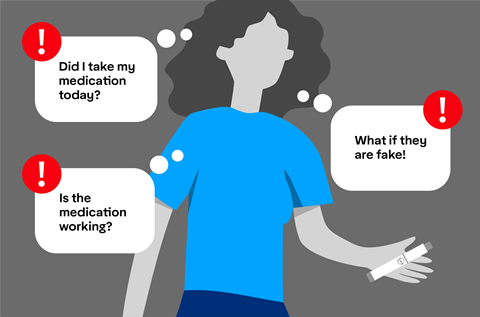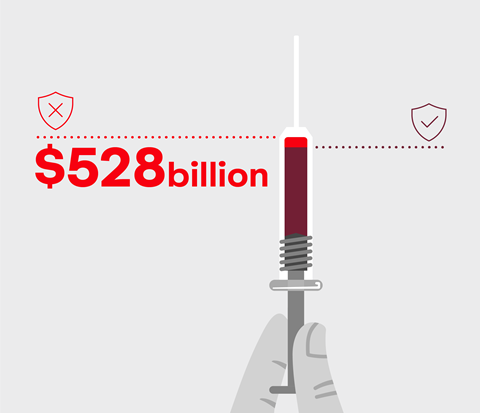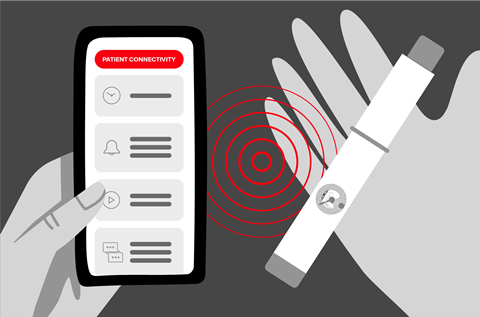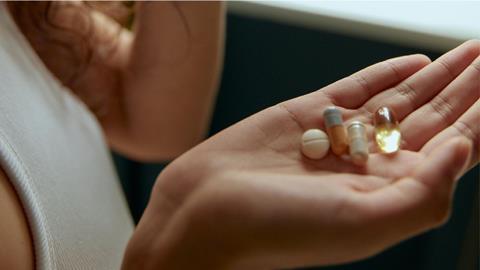Jenni Krohn from Avery Dennison and Sylvia Kaiser-Kershaw from NXP Semiconductors bring us the latest in our Wider View series.
Managing illness can be tough for many patients. This story follows Alex, who lives with a chronic health condition, and shows how a simple idea for drug packaging can help her manage her medication and improve her health.
Alex’s medication worries
For Alex, every day should start and end with taking her medications. She knows that not taking her medicines can lead to adverse effects, but sometimes she makes mistakes in the self-administration, or simply forgets. Her challenges are familiar:

- Did she or didn’t she? Alex has a busy family and work life and often forgets to take her medications on time. She occasionally has difficulty self-injecting as she lacks clear instructions, leading to health risks.
- What if they are fake? She buys her medicines online and worries about them being genuine. She hears about the rise of counterfeit drugs, which makes her hesitant to take new refills. - What if the drugs have expired? She doesn’t always check the packaging and fears taking something that is out of date.
- Is it working? As her condition feels stable, Alex doesn’t speak to her healthcare provider very often. She sometimes wonders if she is up to date with the latest progress on managing her condition effectively.
Common problems that cost billions
Medication non-adherence affects millions of patients globally. It is estimated that 50%1 of patients with chronic illnesses do not take their medications as prescribed, leading to significant health risks and increased healthcare costs. The cost to the global healthcare system is estimated to be $528 billion2 annually.

Patients may be non-adherent for various reasons, such as lacking usage directions, forgetting doses, fear of side effects, financial worries, or lack of symptoms. This can lead to treatment failure, increased hospital readmissions, additional medical/surgical procedures, and excess healthcare costs.
The rise of counterfeit drugs made from substandard or falsified ingredients is another major issue, posing serious health risks. The World Health Organization (WHO)3 has estimated that 10% of global pharmaceutical commerce, or $21 billion worth, involves counterfeit drugs. Such drugs may result in adverse events, treatment failure, resistance, toxicity, and even death. This problem is aggravated by the complexity of global supply chains and the increase in online pharmacies.
Unsurprisingly, there is a direct correlation between the demand for a drug and the availability of unsafe or counterfeit supplies. The gray market includes drugs diverted from authorized channels. These products could be authentic but are no longer safe for consumption due to improper storage, expiration, or counterfeit that have been altered, for example by being diluted or made with cheap ingredients.
Helping patients with smart packaging
Intelligent labels are giving packaging an active role in healthcare. Both primary packaging, for example medicine vials, syringes, pens, and auto-injectors, as well as secondary packaging cartons can have an intelligent label applied that includes a Near Field Communication (NFC) tag.
For patients this opens up a world of support, both practically and emotionally. Using their smartphones patients can digitally authenticate drugs equipped with secure NFC technology, and detect tampering. With just one phone tap on the medication packaging, a patient like Alex can confirm if her drugs are genuine. This quick, clear, unambiguous result gives instant peace of mind.
Through interactive applications, coupled with a website or an app, Alex can get easy access to medication information, self-application guidance and track adherence using the same technique. She can access information such as dosage instructions, warnings and contraindications, expiration dates, and storage guidelines upon a simple phone tap. For tracking and monitoring her treatment over time, a connected drug delivery device with electronic sensing function and coupled with a companion app, can help her capture key information such as dose, date and time, rather than manually recording data. She can also receive an alert when her next dose is due or missed. Such access to product and application information empowers her to track, comprehend and manage her treatment effectively. This collected adherence data can also be shared with her healthcare provider, keeping them informed of her treatment’s progress.
What is NFC technology and how does it work?
NFC is a short-range wireless connectivity technology that allows the transfer of data between two NFC enabled devices, such as a NFC tag and a mobile phone. It uses two main elements: NFC tags and NFC readers. NFC tags contain small microchips that differ by memory sizes, functionalities and security attributes. They do not require batteries as they are powered by the reader’s field. NFC readers are used in smartphones, but can also be built into reusable medical devices to allow communication between the device and medication. This makes them suitable for many battery-free applications.
Secure NFC tags can greatly enhance product authentication for Healthcare. Authentication involves advanced security checks based on a tag’s data and credentials, such as passwords and cryptographic functions. Authorization then verifies permitted access to a device, its application, and data. By utilizing NFC tags, patients can actively participate in the process by easily authenticating products before purchasing or taking them by using their smartphones.
Exploring Near Field Communication (NFC):
- Short-range data exchange between tags and readers (up to 10cm, less with smartphones)
- Contactless operation at 13.56 MHz, no battery required
- Working with smartphones (native Android, iOS) - app-free or app-based
- Or, automated communication between medication and medication device
- Status awareness such as first opening indication or sensing possible
- Dual-interface tags support also wired connections e.g. to a microcontroller, sensor in device

Which medicines benefit most from connected packaging?
Conditions and medications that require strict adherence to their relevant treatments have the most to gain. Patients and healthcare professionals both need in-depth information, as the consequences of non-adherence can be severe. Many medications, such as insulin for diabetes, biologics for skin conditions, and disease-modifying therapies for MS, are often injectables, which can make self-administration more difficult.
Chronic conditions often require multiple medications, strict adherence, and careful monitoring:
- Diabetes
- Cardiovascular Diseases
- Weight Loss
- Skin Conditions
- Multiple Sclerosis (MS).
NFC secured packaging offers an effective way to protect patients from the harmful effects of counterfeits, safeguarding their well-being. Especially high-value or online purchased drugs are susceptible to counterfeiting. By using NFC technology, manufacturers can provide clear, irrefutable proof of a product’s authenticity directly to the patient.
Benefits for healthcare providers and pharma companies
Smart drug packaging optimizes patient care, reliably protects product and patient safety, and ultimately helps reduce the cost of healthcare. From source, throughout the supply chain to the end patient, packaging using connectivity technologies such as NFC enables integration of product-specific information. This enables a transparent supply chain, facilitates communication with patients and medical staff, monitors adherence to therapy, and provides transparency regarding product usage in the market.
1. Improved patient outcomes
By helping patients like Alex manage their medications more effectively, pharmaceutical companies and healthcare providers can ensure better health outcomes and reduce complications related to non-adherence.
2. Enhanced safety
Digitally authenticating medications equipped with secure NFC tags via smartphone helps prevent the use of counterfeit drugs, ensuring product and patient safety. Tags with electronic first opening indication enable detection of possible tampering of packages upon a tap. A patient like Alex receives immediate feedback indicating the authenticity and integrity of the drug, while the pharmaceutical company gains valuable information such as geolocation to monitor the drug supply chain and combat potential gray market activities.
For reusable medical devices, the “lock-and-key” principle ensures device recognition of original manufacturer consumables, guaranteeing optimal performance and safety. The reusable device is equipped with an NFC reader to read a consumable equipped with an NFC tag automatically and contactless. The data stored on the NFC tag alerts the user of wrong, counterfeit or expired products, and increases patient safety during self-administration, by avoiding application errors. Consumable tag data can also be used for automatic device setup, eliminating manual configuration.
3. Better data for treatment effectiveness
With a patient’s permission, therapy adherence data sets with corresponding medication batches and timestamps can be stored, facilitating in-depth data analysis and processing. Information can be shared with one’s clinician, allowing them to monitor their patients more closely and adjust treatment plans as needed, leading to more personalized and effective care. Proven drug effectiveness and better outcomes also benefit the pharmaceutical manufacturer, especially when dealing with outcome-based reimbursement programs.
4. Cost savings
Smart drug packaging can cut healthcare costs by verifying drug authenticity and promoting patient adherence. It reduces the risk of adverse reactions from counterfeit drugs, prevents unnecessary hospitalizations, and helps improve patient adherence.
5. Direct patient engagement:
With the aid of NFC technology, pharmaceutical companies can communicate and build direct relationships with patients like Alex. This direct channel can enhance patient education and be used for practical services, such as refill reminders, leading to more informed and effective treatment plans. Pharmaceutical companies will also gain access to data and insight into customer behavior previously out of their reach. Additionally, it presents the potential to build trust, protect brand reputation and explore direct-to-consumer business models.
What connected medicine packaging means for healthcare
We believe in more personalized, patient-centric and safer care. We see how technology can bridge the gap between patients, healthcare providers, and pharmaceutical companies.
For patients, connected packaging can mean better physical and emotional support to manage their chronic medical condition.
Imagine how Alex’s healthcare experience could be enhanced with smart packaging and a dedicated app on her phone. The app goes beyond sending reminders to take medications. With it, Alex can now conveniently track her adherence over time, review her treatment history, and monitor her progress, empowering her to take a more active role in managing her health. It also provides a convenient way for Alex to consult with her doctor remotely, a crucial option when she is hesitant about starting new medications or concerned about side effects. Additionally, the app facilitates connections with individuals facing similar conditions, offering her moral support, practical advice, and a sense of community.
From helping patients with adherence to providing a convenient way to sign up for a safe, automated refill service, to reliably verifying a product is genuine and safe to use, smart technology including connected packaging will help millions of patients like Alex.
For healthcare providers, real-time data collection and remote monitoring pave the way for more adaptive and responsive treatment plans, tailored to individual patient needs. For pharmaceutical manufacturers, this innovation promises greater transparency, security and integrity within the supply chain, while direct communication channels foster loyalty to the drug and the company among physicians and patients.
Ultimately, this leads to improved health outcomes, cost savings, and a more efficient healthcare system. Smart packaging has the potential to support new standards for medication safety, adherence, and patient engagement shaping a more interconnected future for healthcare.
References:
1: M.T Brown and J.K Bussell (2011) Medication Adherence: WHO Cares?
2: Watanabe JH, McInnis T, Hirsch JD. Cost of Prescription Drug-Related Morbidity and Mortality. Ann Pharmacother. 2018 Sep;52(9):829-837. doi: 10.1177/1060028018765159. Epub 2018 Mar 26. PMID: 29577766.
3: A study on the public health and socioeconomic impact of substandard and falsified medical products. Geneva: World Health Organization; 2017. Licence: CC BY-NC-SA 3.0 IGO. Link: https://iris.who.int/bitstream/handle/10665/331690/9789241513432-eng.pdf;sequence=1
Company Profiles

rfid.averydennison.com

www.nxp.com

This premium feature brings a completely new way for you to interact with our audience through a combination of collaborative editorial and premium promotion. An article written together between you and Packaging Europe’s content team, The Wider View will have a dedicated widget across all web pages & eNewsletter, and will link to a stunning, long-format web page put together by our design team featuring your graphics and branding. Carrying no other advertising, and pushing the limits of ordinary web communications, this is the ultimate digita















No comments yet